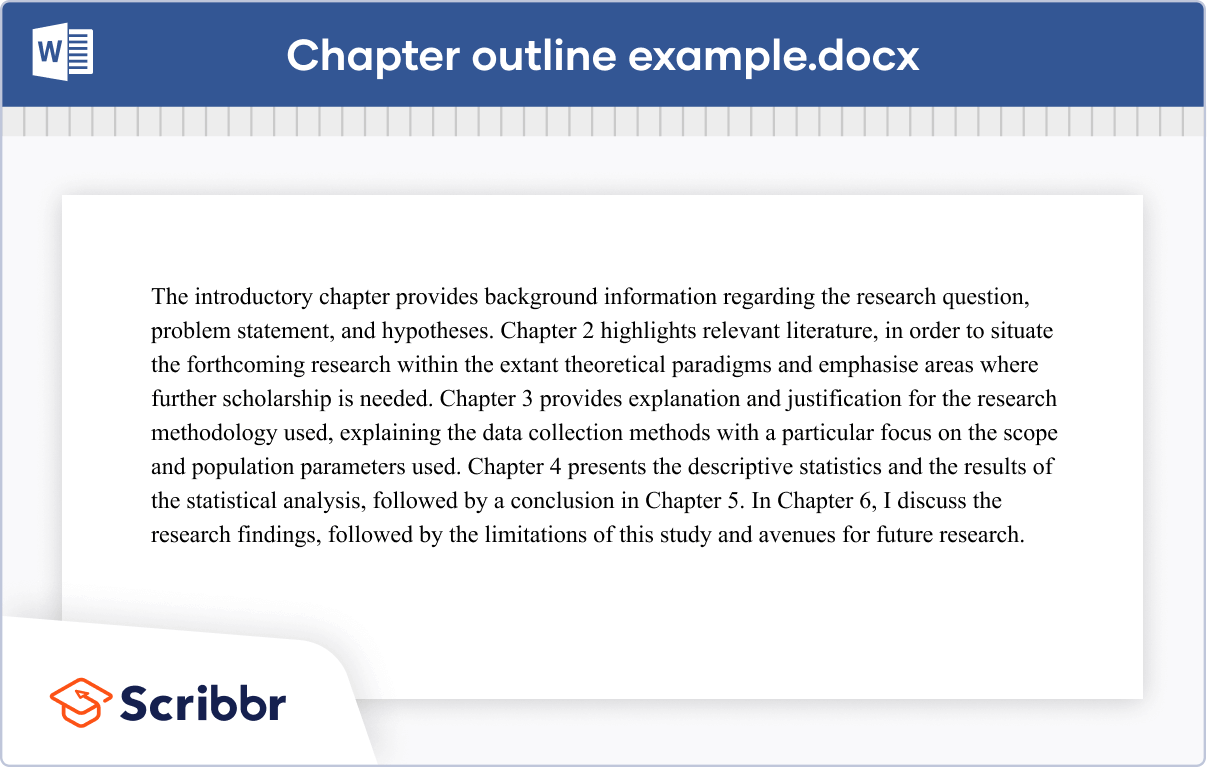Dissertation & Thesis Outline | Example & Free Templates
A thesis or dissertation outline is one of the most critical early steps in your writing process. It helps you to lay out and organise your ideas and can provide you with a roadmap for deciding what kind of research you’d like to undertake.
Generally, an outline contains information on the different sections included in your thesis or dissertation, such as:
- Your anticipated title
- Your abstract
- Your chapters (sometimes subdivided into further topics like literature review, research methods, avenues for future research, etc.)
In the final product, you can also provide a chapter outline for your readers. This is a short paragraph at the end of your introduction to inform readers about the organisational structure of your thesis or dissertation. This chapter outline is also known as a reading guide or summary outline.
How to outline your thesis or dissertation
While there are some inter-institutional differences, many outlines proceed in a fairly similar fashion.
- Working Title
- Abstract
- ‘Elevator pitch’ of your work (often written last).
- Introduction
- Introduce your area of study, sharing details about your research question, problem statement, and hypotheses. Situate your research within an existing paradigm or conceptual or theoretical framework.
- Literature Review
- Subdivide as you see fit into main topics and sub-topics.
- Methodology (can differ between quantitative and qualitative research)
- Describe your research methods (e.g., your scope, population, and data collection).
- Results
- Present your research findings and share about your data analysis methods.
- Conclusion
- Answer the research question in a concise way.
- Discussion
- Interpret your findings, discuss potential limitations of your own research and speculate about future implications or related opportunities.
Dissertation and thesis outline templates
To help you get started, we’ve created a full thesis or dissertation template in Word or Google Docs format. It’s easy adapt it to your own requirements.
Download Word template Download Google Docs template
Chapter outline example
Sample sentences for your chapter outline
It can be easy to fall into a pattern of overusing the same words or sentence constructions, which can make your work monotonous and repetitive for your readers. Consider utilising some of the alternative constructions presented below.
Example 1: Passive construction
The passive voice is a common choice for outlines and overviews because the context makes it clear who is carrying out the action (e.g., you are conducting the research). However, overuse of the passive voice can make your text vague and imprecise.
Example 2: IS-AV construction
You can also present your information using the ‘IS-AV’ (inanimate subject with an active verb) construction.
A chapter is an inanimate object, so it is not capable of taking an action itself (e.g., presenting or discussing). However, the meaning of the sentence is still easily understandable, so the IS-AV construction can be a good way to add variety to your text.
Example 3: The I construction
Another option is to use the ‘I’ construction, which is often recommended by style manuals (e.g., APA Style and Chicago style). However, depending on your field of study, this construction is not always considered professional or academic. Ask your supervisor if you’re not sure.
Example 4: Mix-and-match
To truly make the most of these options, consider mixing and matching the passive voice, IS-AV construction, and ‘I’ construction.This can help the flow of your argument and improve the readability of your text.
Sample verbs for variation in your chapter outline
As you draft the chapter outline, you may also find yourself frequently repeating the same words, such as ‘discuss’, ‘present’, ‘prove’, or ‘show’. Consider branching out to add richness and nuance to your writing. Here are some examples of synonyms you can use.
| Address | Describe | Imply | Refute |
| Argue | Determine | Indicate | Report |
| Claim | Emphasise | Mention | Reveal |
| Clarify | Examine | Point out | Speculate |
| Compare | Explain | Posit | Summarise |
| Concern | Formulate | Present | Target |
| Counter | Focus on | Propose | Treat |
| Define | Give | Provide insight into | Underpin |
| Demonstrate | Highlight | Recommend | Use |
Frequently asked questions about outlines
Cite this Scribbr article
If you want to cite this source, you can copy and paste the citation or click the ‘Cite this Scribbr article’ button to automatically add the citation to our free Reference Generator.
George, T. (2022, June 08). Dissertation & Thesis Outline | Example & Free Templates. Scribbr. Retrieved 14 April 2025, from https://www.scribbr.co.uk/thesis-dissertation/outline-thesis-dissertation/
